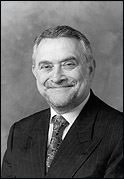All that pollutes isn't all bad
All that pollutes isn't all bad McGill University
User Tools (skip):
All that pollutes isn't all bad
 Dr. Salvador Moncada
Dr. Salvador Moncada |
|
No scientific assumption is safe, as long as open-minded research continues to challenge conventional wisdom. Who, for instance, would ever question that pollutants are bad for one's health?
Dr. Salvador Moncada would, and did. The renowned medical researcher, who spoke at the McIntyre Medical Sciences Building on Tuesday, led a research effort in the 1980s to determine if nitric oxide (NO), a pollutant found in car exhaust, plays a beneficial role in the human body. His research team announced in 1987 that NO is actually made by blood vessels and is essential for regulating blood pressure.
"We found that nitric oxide controls the diameter of blood vessels, thus regulating blood pressure and blood flow, and that a lack of nitric oxide might be involved in diseases like hypertension," Moncada said in an interview following his lecture.
The scientific community didn't exactly leap to embrace the discovery.
"It seemed to take the whole of the scientific community by surprise when we published it in '87. There was a great disbelief at the time; it took some time before people started to accept the idea that a pollutant was also made by cells for specific biological purposes."
That initial reaction softened as evidence mounted that NO plays a role in many physiological processes. For example, microphages, cells involved in the immune system, produce NO to kill invading germs; NO enables penile erections; and the brain uses it as a primary neuron signal transmitter.
"Nitric oxide was later found in the central nervous system, and it is an important mediator, a communication system between neurons. It was also known that when you activate white blood cells, they produce nitrate, the end product of NO production. That led to the idea that NO was involved in immunological reactions."
Not surprisingly, given that the stuff is also toxic, an excess of it has also been linked to a battery of diseases, including diabetes, hypertension, cancer, stroke, arthritis and asthma.
"It is clear that too much nitric oxide will produce damage. In asthma, it has been shown that there is excess production of nitric oxide in the airways. In arthritis, excess production causes chronic inflammation in the joints."
Moncada's risky adventures have inspired research into other toxic emissions from automobile engines. He notes that several American research teams are trying to determine if carbon monoxide, the most toxic of car emissions, can have beneficial effects for humans.
"Some people claim that carbon monoxide is also produced in the body, for biological functions, but the evidence for that is not definitive yet."
Such a line of scientific inquiry would have seemed outrageous before Moncada's research on NO.
"Previously, research on pollutants focused on the damage that they can do. Certainly no one besides us thought that a toxic gas could have a beneficial role in the human body."
Breakthroughs such as Moncada's continue to stun and shock the scientific community, but Moncada feels that scientific inquiry will always lead to the unexpected.
"The safest prediction in science is that we won't be able to predict what the next discovery is going to be. Very often, the pursuit of a particular line of research leads to an end result that was never suspected by the researchers. But I don't think that we really stumble across breakthroughs. New discoveries are made by prepared minds."
Moncada says that he lives for the high wire act of research that pushes boundaries and seeks to challenge scientific orthodoxy. His taste for adventure may stem from his unusual beginning for one who has been at the forefront of experimental pharmacology for the past 30 years. Born in Honduras, the Salvadoran-trained physician was forced by El Salvador's political climate to immigrate to the United Kingdom. There he did his PhD in pharmacology and is now the director of the Wolfson Institute for Biomedical Research, which he founded six years ago at the University College of London.
Life in research he finds both "exciting and exhilarating. Sometimes you don't know whether what you are seeing is reality, or whether it is something you are imagining. It makes you very insecure, but it is the same feeling as the explorer of a new area of the world, or of the moon; you are going where nobody has been before."
Dr. Moncada was invited by the Department of Pharmacology and Therapeutics as this year's Burroughs-Wellcome invited lecturer.

